|
|
|
Sort Order |
|
|
|
Items / Page
|
|
|
|
|
|
|
| Srl | Item |
| 1 |
ID:
027063
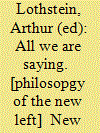

|
|
|
|
|
| Publication |
New York, G.P.Putnam's Sons, 1970.
|
| Description |
381p.
|
|
|
|
|
|
|
|
|
|
|
|
Copies: C:1/I:0,R:0,Q:0
Circulation
| Accession# | Call# | Current Location | Status | Policy | Location |
| 005909 | 355.0218/LOT 005909 | Main | On Shelf | General | |
|
|
|
|
| 2 |
ID:
178139
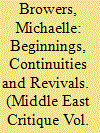

|
|
|
|
|
| Summary/Abstract |
This article examines some of the first translations of Gramsci into Arabic by young, New Left figures associated with a short-lived group called “Socialist Lebanon.” Thinking à la Edward Said about the undertaking of translations of ideas from one context to another and one language to another as a potentially productive act of beginning, I argue that these first translations, undertaken as part of a revolutionary praxis of young, militant intellectuals, not only reveal some of the limitations and possibilities in the development of a Gramscian analysis of Lebanese politics. Rather, their efforts were central to the formation of a New Arab Left and the strands of those beginnings not only are detected in the later work of several of these activist-translators, even after they had moved beyond militant politics, but also remain visible in later revolutionary praxis in the region. By foregrounding the way in which each subsequent “Gramsci boom” (in the 1990s and after 2010) exists in relationship to an ongoing revolutionary praxis that reads and translates the Arab Left anew, I also seek to provide evidence of what Michele Filippini refers to in this issue as an “Arab provincialization” of Gramscian thought and what I prefer to highlight as a continuous tradition of Arab Left revolutionary praxis.
|
|
|
|
|
|
|
|
|
|
|
|
|
|
|
|
| 3 |
ID:
134224
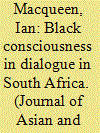

|
|
|
|
|
| Publication |
2014.
|
| Summary/Abstract |
This article examines a progressive moment under apartheid referred to retrospectively as 'the Durban moment' by activists. By exploring the friendship of assassinated activists Stephen Bantu Biko and Richard Turner, the paper calls for a nuanced assessment of the rich context of the emergence of Black Consciousness under apartheid, and shows how the rigid racial and ethnic categories imposed by the state could be challenged by creative and resourceful intellectuals. The paper draws on interviews, writings produced at the time, court transcripts and the secondary literature to argue that Black Consciousness was intimately linked on many levels to this progressive 'moment' in South Africa under apartheid, which has resonances for activists still today.
|
|
|
|
|
|
|
|
|
|
|
|
|
|
|
|
| 4 |
ID:
148936
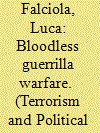

|
|
|
|
|
| Summary/Abstract |
Between 1968 and the late 1970s, a significant number of U.S. white leftist groups escalated their protest to armed struggle. After experimenting briefly with violence, they opted for low-intensity armed propaganda that targeted property and avoided hurting people. By contrast, European leftist groups and anti-colonial organizations in the U.S. made extensive use of antipersonnel violence. Why did U.S. leftists eschew attacks against civilians? Scholarship does not explain this case, as it focuses either on the internal dynamics of a single group or on structural variables. Conversely, this article addresses this question through a historical reconstruction and a multilevel analysis. The research identifies the critique and ensuing de-solidarization by the radical milieu as the main factor accounting for the restraint of violence. This article demonstrates that the radical milieu censored and isolated armed groups as soon as they escalated and began to endanger human lives. Therefore, in order to safeguard the solidarity pact with their constituencies, violent fringes moderated their repertoires of action. This article employs primary sources and original interviews with militants to support this claim and to assess the relevance of three concurrent factors: the trauma generated by the “townhouse incident,” the deterrence by law enforcement, and the militants’ socio-economic background.
|
|
|
|
|
|
|
|
|
|
|
|
|
|
|
|
| 5 |
ID:
126846
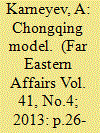

|
|
|
|
|
| Publication |
2013.
|
| Summary/Abstract |
In the second part of this article (the first was published in Far Eastern Affairs, # 3, 2013), the author continues to seek answers to a number of questions associated with the need for an objective assessment of the so-called "Chongqing model.
|
|
|
|
|
|
|
|
|
|
|
|
|
|
|
|
| 6 |
ID:
131256
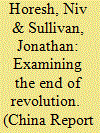

|
|
|
|
|
| Publication |
2014.
|
| Summary/Abstract |
Wang Hui is a significant contemporary Chinese thinker and a key representative of Chinese New Left thought. This article provides a critical review of some of the themes that emerge from Wang's The End of Revolution as a means of situating his position in China's intellectual landscape, with a particular mind to exploring the historicity of Wang's thought as it informs his views. The essay engages some of the key discursive threads in The End of Revolution and provides a critical overview of Wang's positions on neoliberalism, the tension between Western articulations of modernity and China's own self-image.
|
|
|
|
|
|
|
|
|
|
|
|
|
|
|
|
| 7 |
ID:
160507
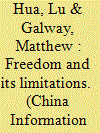

|
|
|
|
|
| Summary/Abstract |
The emergence of Chinese liberalism carries with it a specific China-centric character that reflects both a Chinese and a foreign focus on the nation’s complicated domestic situation. As part of the research dialogue on the intellectual public sphere in China, this article provides a historical perspective of the development of contemporary Chinese liberalism and explores the complexities of those Chinese liberals’ engagement with a number of key issues in political thought, both among themselves and with their principal opponents, the New Left. We review four themes in these ongoing debates: the relationship between freedom and equality; the liberals’ demands for a more open civil society; their call for balanced social structures, including a mechanism for expressing interest; and their search for a new synthesis of Chinese tradition with a strong nation state. Contemporary Chinese liberals propose their visions for a China that operates within and against a Euro-American-dominated system. Thus, their interpretation of classical liberal texts is characterized by one of creative adaptation, and informed by both local and foreign intellectual resources. The article’s ultimate goal is to provide a deeper understanding of the internal debates among Chinese liberals, which may give a sense of the multifarious predicaments and opportunities that China’s intellectuals face as China attempts to pursue wealth, power, and a revitalized role in a new world order.
|
|
|
|
|
|
|
|
|
|
|
|
|
|
|
|
| 8 |
ID:
171252
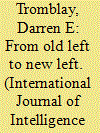

|
|
|
| 9 |
ID:
158265


|
|
|
|
|
| Summary/Abstract |
The papers in this research dialogue section are the product of a project that examines intellectual life in China since the 1990s – chiefly the efforts by academic public intellectuals to rethink China’s past, present, and future in light of the excesses of Mao’s revolution, the challenges emerging from reform, and the rise of China to the status of world economic power. Chinese scholars, having benefited from China’s openness to the world and the relative relaxation of political pressure in China (until recently), have much to say about China and the world that merits our attention. Through creative collaboration between Chinese and international scholars, the articles collected here explore that intellectual public sphere since the late 1990s. The articles were written in Chinese by young PRC scholars and rendered into English through ‘collaborative translation’ teams that pair these Chinese with non-Chinese scholars based in Canadian universities. The net result, grounded on repeated conversations and revisions, is not a simple translation but a co-production of knowledge about China that aims to capture the discourse of Chinese scholarship in a way to make it meaningful to anglophone readers. The articles themselves are not traditional surveys of academic scholarship. Rather they map significant areas of an intellectual world and the arguments within it. Three widely accepted intellectual streams of thought (sichao 思潮) organize these soundings: liberals, New Left, and New Confucian. These reports explore connections between and diversity within and beyond each.
|
|
|
|
|
|
|
|
|
|
|
|
|
|
|
|
| 10 |
ID:
158267


|
|
|
|
|
| Summary/Abstract |
In post-Mao China, a group of Chinese intellectuals who formed what became the New Left (新左派) sought to renew socialism in China in a context of globalization and the rise of social inequalities they associated with neo-liberalism. As they saw it, China’s market reform and opening to the world had not brought greater equality and prosperity for all Chinese citizens. As part of China Information’s research dialogue on the intellectual public sphere in China, this article provides a historical survey of the development of the contemporary Chinese New Left, exploring the range of ideas that characterized this intellectual movement. It takes as its focus four of the most prominent New Left figures and their positions in the ongoing debate about China’s future: Wang Shaoguang, Cui Zhiyuan, Wang Hui, and Gan Yang.
|
|
|
|
|
|
|
|
|
|
|
|
|
|
|
|
| 11 |
ID:
113767
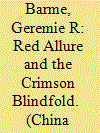

|
|
|
|
|
| Publication |
2012.
|
| Summary/Abstract |
This essay takes as its starting point the precipitous fall of Bo Xilai in March 2012 and discusses the context of the abiding significance of China's red legacies, in particular Maoism, in understanding the People's Republic of China today. While thinkers labour to salvage Marxism, the red legacy constitutes a body of cultural, intellectual, and linguistic practices that are profoundly ingrained in institutional behaviour in China. This study explores to what extent this version of the red legacy leeches out the power of other modes of leftleaning critique and independent thought, and abets the party-state in its pursuit of a guided, one-party neo-liberal economic agenda.
|
|
|
|
|
|
|
|
|
|
|
|
|
|
|
|
| 12 |
ID:
132061


|
|
|
| 13 |
ID:
124200


|
|
|
|
|
| Publication |
2013.
|
| Summary/Abstract |
In the year that has passed since the "Chongqing drama" began, a great many works have been published that throw light on the unique experience of the socioeconomic development of one of China's regions. Was there truly a "Chongqing model"? If so, what were its distinguishing features? What kind of future might the leftist leanings of the public political spectrum have after the 18th CPC Congress? This article attempts to answer a number of questions associated with the need for an objective assessment of the "Chongqing model."
|
|
|
|
|
|
|
|
|
|
|
|
|
|
|
|
|
|
|
|
|